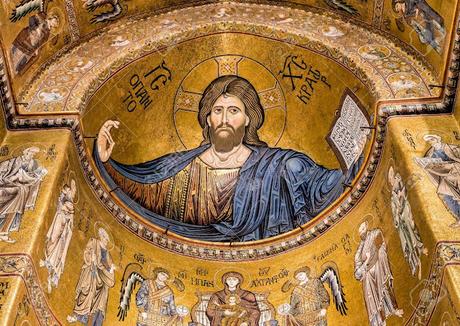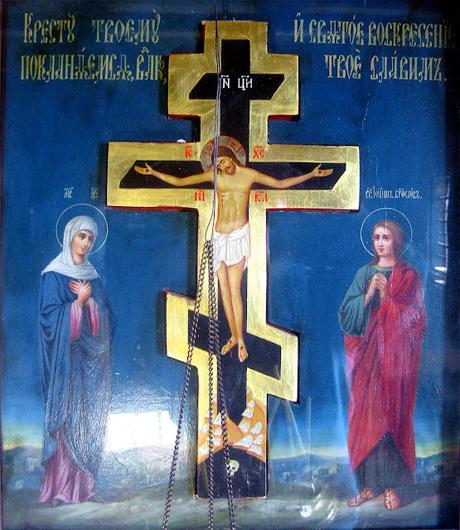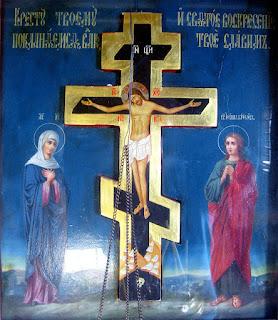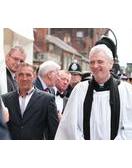And the first reading that we had today (from Colossians 1.11-20) speaks of Christ as the ruler of all:
This Christ is the King of all creation: he is the image (eikon) of the invisible God, in whom all the fullness of God dwells
All things were created through him and for him
He is the one who holds all things together
He is the one who is the head of creation (that is what it means when it says that he is ‘the first born of creation’) and he is the head of the new creation (the church, the community of those who are born from the dead)
He is the one who can reconcile all things. It is in our individual relationship with him, as we become part of him and he becomes part of us, that we each discover our unity, that we are part of each other, and that every other is part of us.
And so we have the image of Christ the King (from Monreale Cathedral, Sicily), Jesus Christ the Pantocrater, the ruler of all

Christ is exalted. He rules on high. His arms embrace all of creation. In one hand he holds the scriptures: ‘I am the light of the world’, and with the other he blesses
This is Kingship as we understand it: full of power and might. He is the one to whom we bow in awe and fear, before whom we kneel to serve.
But we also have a very different picture of Christ the King from Luke.
It is the image of the crucified King

Jesus, the one crucified, is clearly the King.
Pilate writes an inscription over his head. Maybe he thought he was mocking Jesus, but it was also the truth: ‘This the King of the Jews’
But this is the King who refuses to save himself.
I was speaking with someone yesterday who was telling me that this was the fact that drew him first to Jesus. He could not understand why Jesus, who had the power to heal the sick, to walk on water, to calm storms and who could raise the dead, did not come down from the cross.
Three times in our short reading from Luke there is a reference to ‘saving himself’.
The leaders say, v35: ‘he saved others, let him save himself if he is the Messiah (the King) of God, his chosen one’
The soldiers mock, v37: ‘If you are the king of the Jews, save yourself!’
One of the criminals crucified with Jesus says, v39: ‘Are you not the Messiah? Save yourself and us!’
And yet Jesus, who could have saved himself, refuses to save himself.
When we cry out to Jesus, when we call on him to save us – from an unbearable situation, from terrible pain, from death – and nothing seems to happen, it does not mean that he is powerless or absent.
Far from it. As Jesus hangs on the cross, he chooses not to save himself.
He is showing his power not by coming down from the cross, but by remaining on the cross, in obedience to his Father and in love for us.
This is what he came to do. He came to die.
From as early as chapter 9 in Luke, Jesus had set his face to go to Jerusalem where he knew that crucifixion lay ahead of him.
He rebukes Peter, when Peter suggests that there is another way out.
He prays in the garden of Gethsemane: ‘Father, take this cup from me, but not my will but yours be done’.
He knows that this is what he has to do.
Crucifixion is one of the most terrible, cruel forms of judicial execution that human beings have devised. But what Jesus suffers is far more than even what those crucified with him suffered.
As he hung there, he hung as an innocent man, but as one who was before God guilty. He became the lamb of God, the sacrificial offering ‘who took away the sins of the world’; he was the suffering servant ‘on whom all our iniquities are laid’.
He took onto himself all our sin.
God the Father turns his face away from his beloved Son, and the sky turned black in the middle of the day.
The Lord Jesus, in his crucifixion, really did descend into the pit of God forsakenness, of hell.
And the message of Luke here, as he tells us of the mocking of the leaders, the soldiers and the criminal, is that Jesus, the King, could have saved himself.
But he chose not to. Because of his obedience to his Father and his love for his Father and for us.
And because King Jesus hung on the cross, there are two immediate consequences
1. The first is that sins are forgiven
They crucify Jesus and he cries out, ‘Father, forgive them; for they do not know what they are doing’.
Maybe they did not realize that in crucifying Jesus, they were crucifying the Lord of Glory, but they do know that they are crucifying an innocent man.
And yet he prays that God will forgive them
Every day in Morning Prayer we repeat the words of Zechariah who prophecies over the baby John the Baptist: He speaks of how he will be a herald who goes ahead of the coming King.
But this herald will not be like other heralds. They would declare that the king was coming, that people better sort out their act, and make sure that rebels were suitably dealt with: in prison or preferably dead! But that was not John’s task.
‘And you child shall be called the prophet of the most High, because you will go before the face of the Lord to prepare his way; to give his people knowledge of salvation by the forgiveness of all their sins’.
Jesus came 2000 years ago not to bring God’s wrath on sinners.
He came to bring God’s forgiveness for sinners
Because Jesus did not save himself, but died on that cross, he dealt with our sins.
He took them onto himself.
There are many people in our world who claim that they do not feel guilty because they have never done anything really wrong.
Perhaps we do not feel guilty because we think that we have lived by the standards of the society in which we live. By our terms, we have been ‘good’ people. And if we have broken the standards expected by our society, we have paid the penalty, and so there is nothing outstanding.But the standards of our society can be so perverted and twisted when compared with the standards of the kingdom of God, that that means nothing.
Or perhaps we have so destroyed our consciences because we have become accustomed to doing what is evil that we now feel no guilt when we do what is evil. I wonder whether the soldiers, having beaten, mocked and then crucified Jesus, felt any guilt. I doubt it.
But when God is at work in a person, when the Holy Spirit does begin to show us that Jesus is King, that we have rejected his love and rebelled against him, then we will begin to feel guilty.
And that is OK – provided we do not give up, or do not try and punish ourselves, or do not try to make it up to God and earn our forgiveness. We can’t do that
It is OK if it means that we turn to our King, and we hear his words, ‘Forgive them for they do not know what they are doing’ and receive his forgiveness – AS A GIFT.
Because Jesus, our King – against whom we rebelled – did not save himself, we can receive forgiveness of sins
2. The second consequence is that the door into heaven is opened
The second criminal on the cross, almost certainly being executed for murder, recognises that Jesus is King.
‘Jesus, remember me, when you come into your Kingdom’
He does not ask Jesus to save him from crucifixion or death. He has already, even in his pain, begun to see that there is something so much bigger going on here.He has begun to recognize that the man hanging on the next cross is a king, but is a king who is so much more powerful than all the rulers of this world put together.His Kingdom is not of this world, but it penetrates in and through this world. It is the Kingdom by which all the kingdoms of this world are judged and will be judged.
And so he turns to Jesus and cries out for mercy
And Jesus simply says to him, ‘Truly I tell you, today you will be with me in Paradise’
I’m not sure which of those words would have been most comforting
Today – in other words you will soon be out of this hell that you are in
Paradise – that is how Jesus describes the Kingdom of Heaven, that place which is described by the prophets in the Old Testament, but which is beyond our imagination
With me – the King who loves us and died for us invites us to live in his presence for eternity.
Because Jesus, the King, did not save himself, the door into heaven is open
So we see this other icon of Christ the King
It is one you will find in most Orthodox churches
And it is also very similar to some of the amazing Russian old believer crosses – I bought one at Ismailova market a few weeks ago.
It is a sermon in a picture
And it sums up this passage
 We have Christ on the cross. The name above the shoulders of the figure is ‘Jesus Christ’
We have Christ on the cross. The name above the shoulders of the figure is ‘Jesus Christ’ And this Jesus is King
Above his head is the inscription that Pilate wrote – in Greek, Aramaic and Latin. Here it is in Slavonic! Four letters standing for Jesus of Nazareth, the King of the Jews
The halo, nimbus, radiance around Jesus’ head has the phrase ‘O WH’ which is Greek for ‘The one who is’. When Moses asked God to reveal his name, God replied: ‘I am who I am’ (O WH)
So this is Jesus the King – but the king who chose not to save himself, and who died.
But there is more.
Blood is dripping from Jesus’ feet onto a skull beneath
According to tradition, and I suspect it is a tradition which came from a sermon illustration in order to explain a God truth, Jesus was crucified over the place where Adam, the first human, and the first to rebel against God, was buried. His blood falls on Adam’s skull.
He came to bring forgiveness to all who rebel against him, to bring life to the dead.
Jesus feet are nailed to a cross bar that is on a diagonal. It stands for what you might think it stands. Some will go up, and some will go down. The thief on his left continues to mock and reject Jesus. The thief on the right receives Jesus, and is promised, ‘Today you will be in Paradise with me’.
On many crosses you will see four letters at the feet of Jesus: МЛРБ – место лобное рай бысть: the place of torment becomes (the door to) Paradise.
And one other thing. You will often see the word НИКА somewhere. It is the Greek for ‘He wins, he conquers’.
This is Jesus the King who conquers.
But he conquers not with the sword but with the cross,
not with the power that crushes the other to the ground and forces them to serve him.
This is the one who conquers the devil and evil by his love and obedience, who brings forgiveness and opens the gateway to paradise.
No wonder we acclaim him in the words at the top of this icon:
“We worship your cross, O Lord, and we glory in your holy resurrection.”

